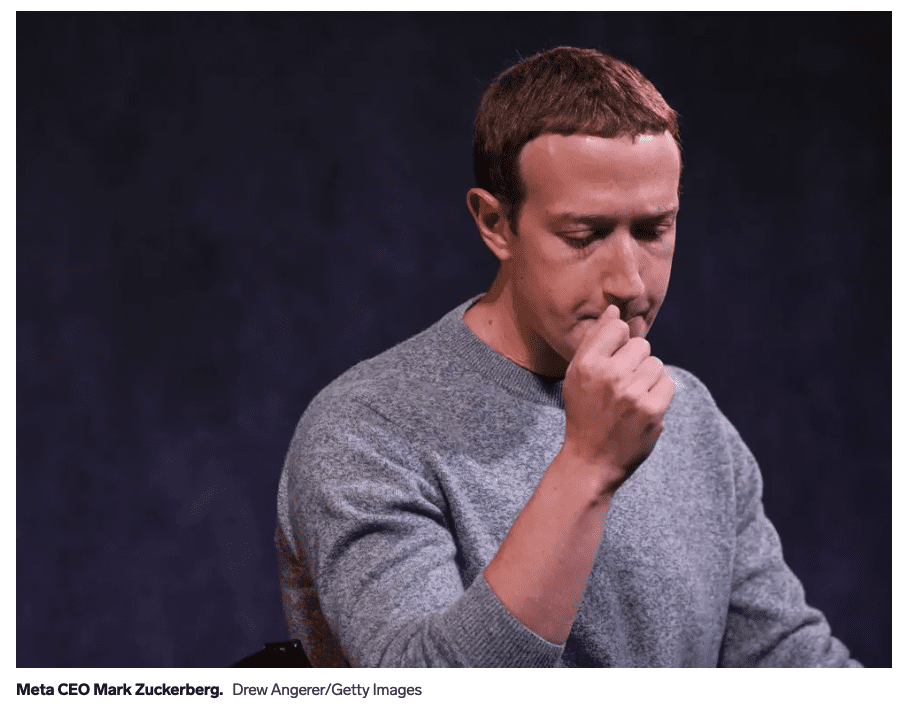- Meta’s ad problems go beyond the economic slump.
- It’s not the must-buy it used to be and advertisers are starting to shift dollars elsewhere for the first time.
- As a result, Meta’s expected to lose market share for the first time this year.
Digital ad sellers are having a bad year. But for Facebook parent Meta Platforms, the problem is worse — and it may be one it doesn’t recover from.
Already, analysts expect the social giant to record zero growth in the second quarter, in a first for the company. Mark Zuckerberg himself called the situation “one of the worst downturns that we’ve seen in recent history,” according to Reuters. The rest of the digital ad sector, made up of Google, Twitter, Snap and others, is also facing a slowdown in growth.
What’s different is that Meta is in a perfect storm. As a result, more advertisers are not just increasingly willing to diversify away from Meta, but doing so for the first time. It’s a big shift for a company that historically could always count on their dollars, scandal after scandal, as long as their ads performed.
One top exec at a major holding company agency said the economic downturn would affect everyone in the second half but that significantly, Meta would lose share of client spending as well, saying, “This is a first.”
The major ad forecasters have cut their overall ad spending outlooks for the year, and other agency execs say Meta, long considered a “must-buy,” is now at the top of clients’ lists of places to cut.
Analysts, too, say Meta is coming down to Earth after years of explosive growth. Needham analyst Laura Martin on Monday downgraded Meta’s stock from “hold” to “underperform,” given its guidance for slower revenue growth and huge investment in its vision for the metaverse. Matthew Bailey, principal analyst at research firm Omdia, forecasts that the company will post 16% growth for all of 2022, down from 37% in 2021.
“We are forecasting that Meta’s share of global net online advertising revenue will decline for the first time in 2022,” Bailey said.
A Meta spokesman responded with a statement: “We believe our platforms offer businesses the best ways to connect with people, so we’re focused on successfully executing on our long-term plans.”
Business model, reputation problems
Some of Meta’s challenges go to the business model. Facebook has been harder hit than other apps by Apple’s privacy update last year that dented advertisers’ ability to target and measure the effectiveness of their ads. Google, with its core search business, has been more immune to Apple’s privacy update. Google has said it also intends to introduce a similar privacy update for Android apps in the coming years.
The reputation damage caused by the 2020 advertiser boycott over Facebook’s handling of misinformation and hate speech on the app hasn’t gone away. Investors and boards of major Facebook advertisers also are scrutinizing where corporate ad dollars are placed with an eye on compliance with ESG — Environmental, Social and Corporate Governance — criteria.
Lou Paskalis, the former media head for Bank of America and now president of the MMA, a marketing and tech trade association which counts Meta as a member, says other social media companies like Twitter, Pinterest, and Snap do a better job of talking about brand suitability, while Zuckerberg isn’t viewed as being as interested in it as his ad leads once were.
“They’re going to be more thoughtful about when they invest because reputational risk now is part of the ecosystem,” he added of the marketers and chief investment officers he talks to. “Consumers today shop their values more than ever before. And just like with Black Lives Matter, and other social issues, you can’t advertise on platforms that don’t try to fix some of the issues that they’re well known for.”
Meanwhile, Meta’s ad leadership has undergone a big transition. With chief operating officer Sheryl Sandberg’s imminent departure and the exits of multiple top ad leaders including David Fisher and Carolyn Everson, advertisers are getting used to a new team under Marne Levine, who had a long career outside advertising; and Nicola Mendelsohn, whose Facebook advertising career has mostly been outside the US.
The company also announced…
Read The Full Article at Business Insider



